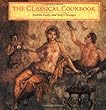Reading list for Roman cuisine
From NovaRoma
Revision as of 03:50, 10 March 2009 by M. Lucretius Agricola (Talk | contribs)
Visit Sodalitas Coquorum et Cerevisiae Coctorum (The Society of Cooks and Brewers).
Before making an entry, please read the instructions for using the template and the special instructions for reading lists.
The Classical Cookbook

Dalby, A., Grainger, S. (1996). ISBN 0892363940
An excellent book which combines historical discussion and classical recipes for satisfying results. Contributed by Julilla Sempronia Magna
Buy from Amazon: Canada UK USA
An excellent book which combines historical discussion and classical recipes for satisfying results. Contributed by Julilla Sempronia Magna
Buy from Amazon: Canada UK USA
Around the Roman Table: Food and Feasting in Ancient Rome

Patrick Faas, Shaun Whiteside trans. (2003). University of Chicago Press. ISBN 0226233472
384 pages, 28 halftones, 29 line drawings [For sale in Canada and the USA only.] Eight recipes on the publisher's website. Contributed by Agricola
Buy from Amazon: Canada UK USA
384 pages, 28 halftones, 29 line drawings [For sale in Canada and the USA only.] Eight recipes on the publisher's website. Contributed by Agricola
Buy from Amazon: Canada UK USA
Roman Cookery: Ancient Recipes for Modern Kitchens

Grant, M. (2008). Serif. ISBN 1897959605
New illustrated edition of the 1999 text. An excellent collection of recipes for preparing everyday Roman meals. Julilla Sempronia Magna. A worthy companion to the Giacosa volume as this book avoids the Apicius recipes altogether, turning instead to Cato, Columella, Pliny, Athenaeus, Bassus, Galen and more. The Latin (or Greek) originals are not included, but are translated literally and then made into very workable recipes. Agricola 08:39, 5 June 2007 (CEST)
Buy from Amazon: Canada UK USA
New illustrated edition of the 1999 text. An excellent collection of recipes for preparing everyday Roman meals. Julilla Sempronia Magna. A worthy companion to the Giacosa volume as this book avoids the Apicius recipes altogether, turning instead to Cato, Columella, Pliny, Athenaeus, Bassus, Galen and more. The Latin (or Greek) originals are not included, but are translated literally and then made into very workable recipes. Agricola 08:39, 5 June 2007 (CEST)
Buy from Amazon: Canada UK USA
A Taste of Ancient Rome

Gozzini Giacosa. (1994). Univ. of Chicago Press. ISBN 0226290328
Nicely translated and illustrated from Apicius, Cato, Columella, Juvenal, Martial and Petronius. Julilla Sempronia Magna. The bulk of the recipes come from Apicius and include the standard numbering from that work. The Latin is always included, then translated, then converted into a modern recipe. Agricola 08:39, 5 June 2007 (CEST)
Buy from Amazon: Canada UK USA
Nicely translated and illustrated from Apicius, Cato, Columella, Juvenal, Martial and Petronius. Julilla Sempronia Magna. The bulk of the recipes come from Apicius and include the standard numbering from that work. The Latin is always included, then translated, then converted into a modern recipe. Agricola 08:39, 5 June 2007 (CEST)
Buy from Amazon: Canada UK USA
The Philosopher's Kitchen: Recipes from Ancient Greece and Rome for the Modern Cook

Segan, F. (2004). Random House. ISBN 1400060990
Modern interpretations of Roman recipes. Contributed by Agricola
Buy from Amazon: Canada UK USA
Modern interpretations of Roman recipes. Contributed by Agricola
Buy from Amazon: Canada UK USA
On-line Cookbooks
Legionary Rations by Paul Elliott
Master Index > English > Ancient Rome
Master Index > English > Nova Roma
Master Index > English > Nova Roma
Master Index > English > Nova Roma > Portals
Master Index > Maintenance Categories > Pages to be deleted > Via Romana > Bibliotheca > Reading list
Master Index > Maintenance Categories > Pages to be deleted > Via Romana > Roman cooking